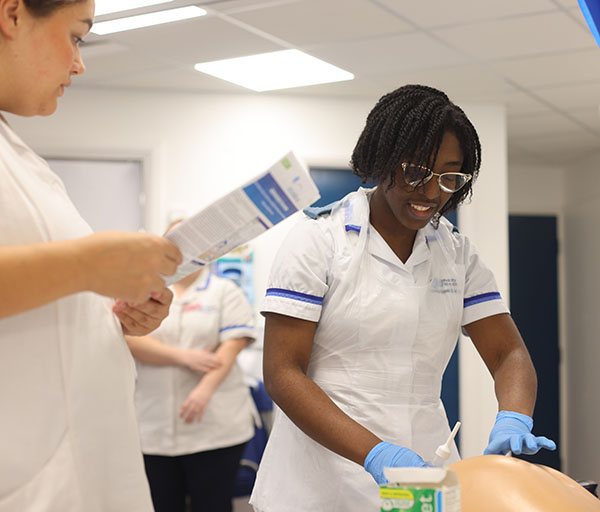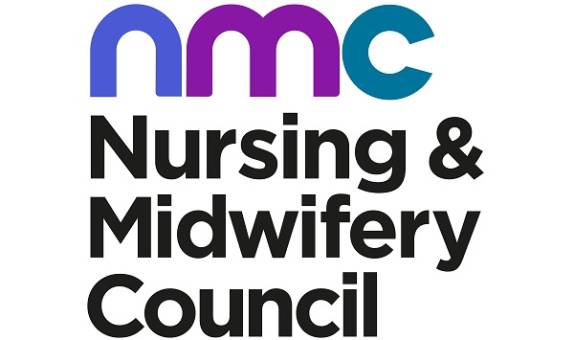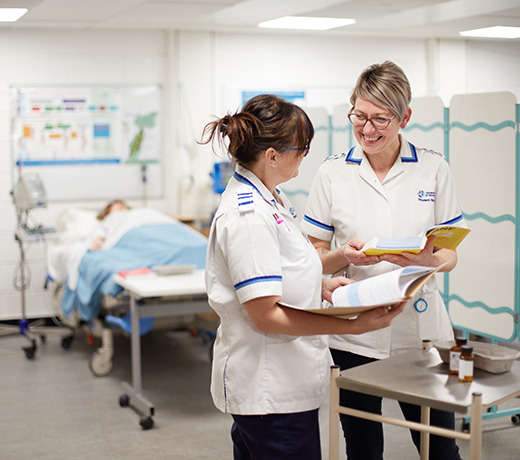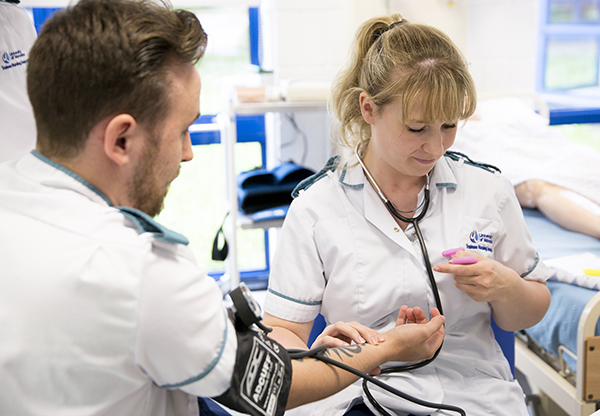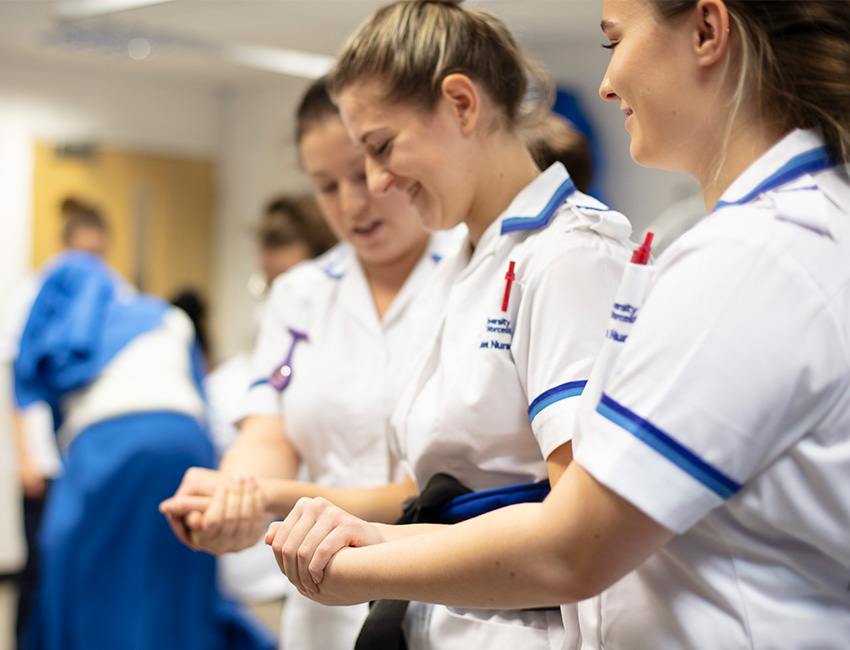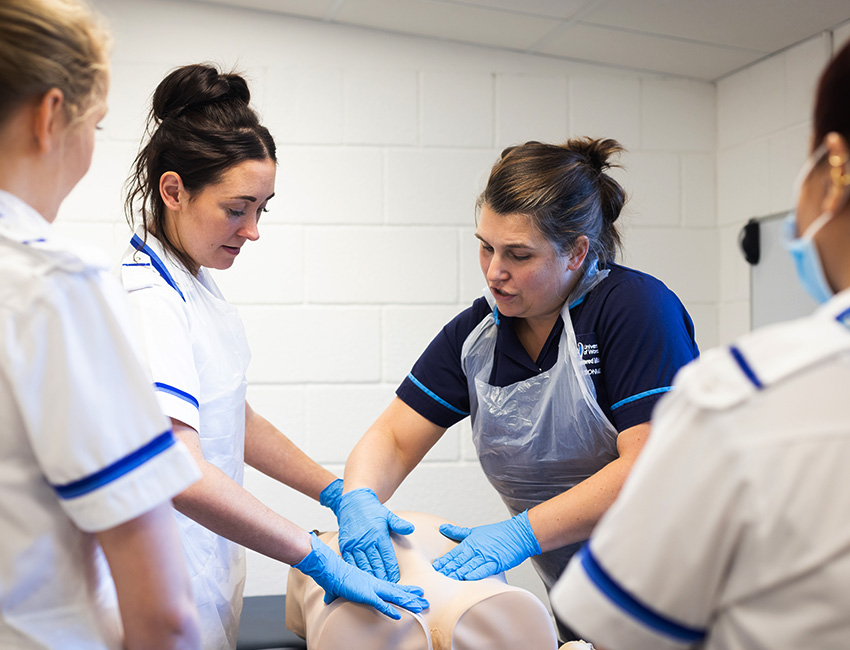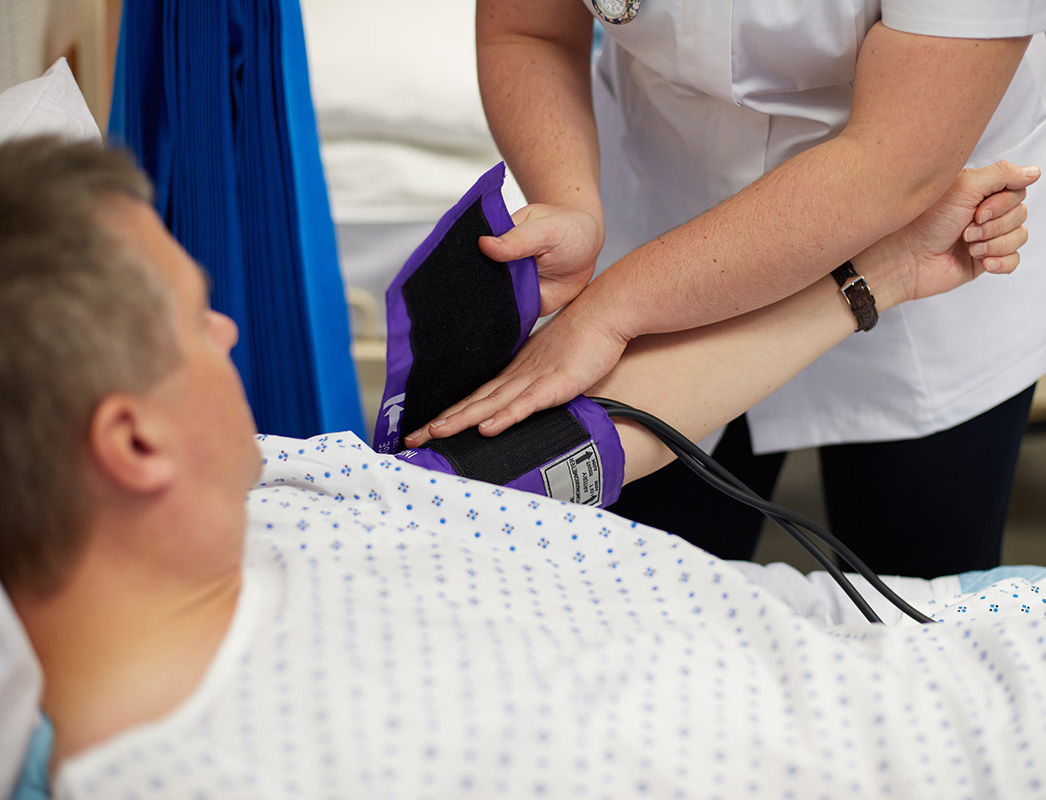From offering one of the first Nursing Associate university courses in England, we’ve developed the course in partnership with regional organisations, students and experts by experience to ensure you graduate with the knowledge and confidence to excel as a Nursing Associate and beyond.
With this degree you’ll be eligible to register with the NMC as a Nursing Associate.
University of the Year finalist
Recognised for our graduate success, we’re shortlisted for University of the Year in the Times Higher Education Awards 2025.
Overview
Study the evidence behind core theories and practically apply them in our simulation centre and on placement.
You’ll learn alongside Nursing students through shared modules and working together on placement and in the Skills and Simulation Centre, where you can put theory into practice in simulated healthcare environments. As a Nursing Associate, you’ll be promoting good health, monitoring care and being an accountable member of the team as you support registered nurses who coordinate and lead in nursing care. To prepare you for these responsibilities, you’ll learn the factors of health and wellbeing throughout the human lifespan, alongside the fundamentals of human anatomy, team working and leadership skills.
Through placements with local NHS trusts and healthcare providers, you’ll benefit from learning from qualified professionals, having a supervisor for additional support and opportunities to network with students from across disciplines within the School of Nursing and Midwifery and beyond.
With a mix of in-person and recorded lectures, independent study, flipped classrooms and practical learning in both the simulation centre and on placement, the course provides an inclusive environment where you’ll be able to learn in the way that best suits you.
At Worcester you’ll also benefit from personalised support from lecturers, your assigned Personal Academic Tutor and Placement Supervisor.
Your Personal Academic Tutor is assigned to you at the start of the course and will support you in your academic progress and career planning. Lecturers will get to know you personally and tailor their guidance to your strengths and learn how to best assist your development on each module.
Placements
Experience a minimum of two placements each year with our excellent NHS trusts and healthcare providers in the region, including:
- Worcestershire Acute Hospitals NHS Trust
- Herefordshire and Worcestershire Health & Care Trust
- University Hospitals Birmingham NHS Foundation Trust
- The Dudley Group NHS Foundation Trust
- Wye Valley NHS Trust
- Gloucestershire Hospitals NHS Trust
- Shrewsbury and Telford Hospital NHS Trust
Whilst on placement you’ll gain access to additional library resources, be supported by a supervisor, and learn from and network with experienced nurses as you build up your own practical experience.
Course content
On this accredited course, you’ll study the evidence behind the core theories and benefit from applying your learning in practical teaching sessions in our simulation centre and during professional practice on your placement.
Our industry informed modules incorporate student and employer feedback, which mean they do occasionally change to ensure your learning stays up-to-date and relevant.
All modules are mandatory to ensure you’re eligible to register as a nurse with the NMC.
We regularly review our courses to reflect the latest research and developments in the subject area, as well as feedback from students, employers and the wider sector. As a result, modules may change to ensure the course remains current and relevant.
Careers
Our graduates have gone on to be employed locally with many of the NHS trust organisations we partner with for your placements. Within these and other organisations, qualified Nursing Associates can choose a range of roles within the NHS. Students can go into careers as:
- Clinical associates
- Care coordinators
- Clinical research associates
- Working with mental health services
Many graduates choose to continue onto our BSc Nursing (Adult) course to become a registered nurse, either straight away or later in their career.
As a Nursing Associate student at the University of Worcester, you’ll have the chance to meet with local healthcare employers to discuss career opportunities and ways to further your professional development. You’ll have access to recruitment events and NHS Trust job advertisements via the teaching team and our Careers and Employability Service, who also provide support in CV writing and preparing for interviews.
Course highlights
Teaching and assessment
Teaching and assessment contents
Theory
You’ll be taught through a combination of campus-based and online lectures, workshops, group activities, real-life case studies and practical learning in the skills and simulation centre, centring your learning in real-life situations. Recorded lectures, flipped classrooms, guided reading, online discussions, and e-learning tools will help you learn at your own pace. Study-skills will also be embedded into the course to help you become independent and confident in your learning.
Practice learning
When working in the skills and simulation centre, you’ll have the opportunity to work with other students, service users/carers, practitioners, technicians and academics, alongside simulation manikins and videos to enhance your practical learning. You will also gain feedback on how you applied your learning in these simulated situations to assist the development of essential skills.
You’ll be offered placements in a variety of healthcare settings where you’ll gain experience in caring for people of various ages and health needs. Not only will these placements provide the chance to put what you’ve learnt into practice, but you’ll gain extra learning opportunities, have access to additional library resources and have personalised support via your practice supervisor.
Support
Throughout the course you’ll be supported by your Personal Academic Tutor who will ensure you are settling into the university, provide signposting information and academic support. They’ll help you reflect on your progress and support your development. You will be invited to meet with your tutor at certain points in the year, but you can request a meeting at any point during your time on the course.
You will have 2 weeks of practical learning in the skills and simulation centre across each year, and an induction will take place prior to placements to ensure you feel prepared.
Entry requirements
UCAS tariff points required: 32
| Qualification | Grade |
|---|---|
| A-level | C |
| BTEC National Extended Diploma | PPP |
Any questions?
If you have any questions about entry requirements, please call our Admissions Office on 01905 855111 or email admissions@worc.ac.uk.
Fees
Fees contents
UK and EU students
In 2026/27 the standard fee for full-time home and EU undergraduate students on BA/BSc/LLB degrees and FdA/FdSc degrees is £9,790 per year.
Tuition fees are reviewed annually and may increase each year for both new and continuing students.
For more details on course fees, please visit our course fees page.
International students
In 2026/27 the standard tuition fee for full-time international students enrolling on BA/BSc/LLB degrees and FdA/FdSc degrees is £17,200 per year.
Tuition fees are reviewed annually and may increase each year for both new and continuing students.
For more details on course fees, please visit our course fees page.
How to apply
How to apply contents
Applying through UCAS
UCAS is the central organisation through which applications are processed for full-time undergraduate courses in the UK.
Read our how to apply pages for more information on the application process, or if you’d like to apply for part-time study.
Contact
If you have any questions, please get in touch. We're here to help you every step of the way.


Sarah Wilson
Senior Lecturer and Course Lead for the Foundation Degree Nursing Associate (FDNA) programme
sarah.wilson@worc.ac.ukAdmissions Office
admissions@worc.ac.uk01905 855111More to explore
Open Days
Visiting us is the best way to get a feel for student life at the University of Worcester.

The City of Worcester
Worcester is a welcoming university city with great transport links and plenty of student parking.

Accommodation
Benefit from our accommodation guarantee. We have rooms on campus to suit every budget including en-suite options.

